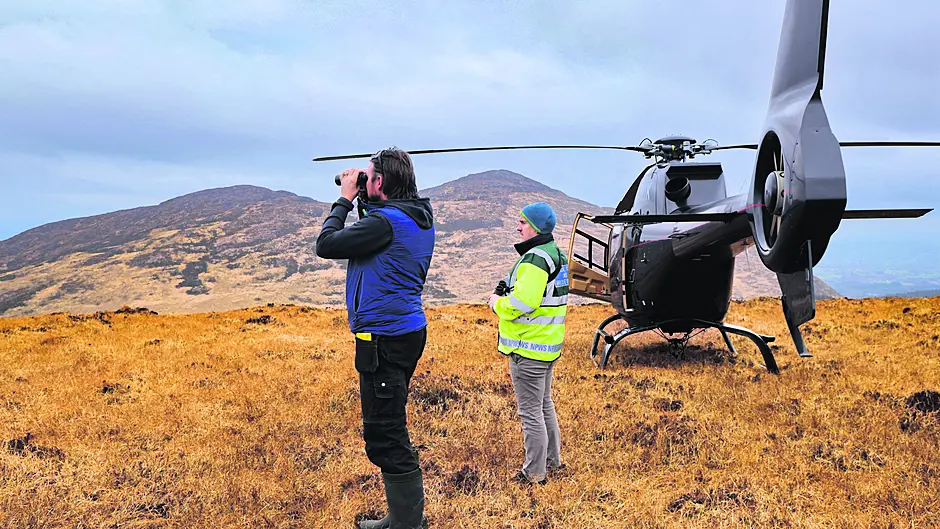While condemning the out-of-control fires which raged across the region last week, the IFA doesn’t want such rare bad behaviour to result in an outright ban on burning land
IFA leaders have described the out-of-control gorse fires that ravaged huge parts of West Cork last week as dangerous and foolish behaviour.
However, they have stood over the practice of burning, during the legally permitted time period, as an effective way to regenerate land, that is also necessary for animal welfare.
Seamus Daly, West Cork IFA sheep chairman said it was important that the irresponsible behaviour of some didn’t result in the lobbying for a blanket ban on gorse fires.
He said that most of the population had no experience of hill fires, so when they see one, understandably, there are feelings of fear.
‘But farmers use roads, streams, and green fields to keep them under control. The onus is on us to share that message, so they don’t instil fear,’ he said.
Mr Daly, who farms on the Sheep’s Head, said he’s part of a local group of farmers who work together when burning scrub land.
‘It’s about the intelligent use of the countryside, knowing the moisture content of the land you’re burning, and not doing it when the land is crisp dry,’ he said.
He said he was upset by the fires that raged last week and said it cannot be a case of ‘lighting a match and leaving it off.’
 Firemen battling an out-of-control gorse blaze in the hills above Bantry, just ahead of the March 1st deadline for a ban on burning land. (Photo: Miki Barlok)
Firemen battling an out-of-control gorse blaze in the hills above Bantry, just ahead of the March 1st deadline for a ban on burning land. (Photo: Miki Barlok)
He also said it was regrettable that fire services were tied up dealing with the blazes that saw Cork County Council Fire Service respond to 71 gorse and vegetation fires, primarily in Bantry, Mizen, Sheep’s Head, Beara and Tragumna, between Friday and the fire deadline of last Wednesday.
‘But in the same way that a dairy farmer reseeds his field, we need to rejuvenate our fodder.
‘It’s also about animal welfare, and preventing the build-up of ticks on animals.’
He also insisted gorse fires didn’t negatively impact wildlife and said ‘overgrown mountains were no good for biodiversity.’
He urged both sides of the argument to find a common ground.
Meanwhile, Munster IFA chair and Courtmacsherry farmer Harold Kingston who previously lobbied for the extension of the ban, if weather conditions required it, called the fires ‘foolish’.
‘What I saw last week in West Cork was not what I campaigned for.
‘The IFA does not endorse that behaviour.
‘There’s a proper way to do this with the likes of fire breaks and if done right, it’s very effective in promoting new growth, and reducing the risk of gorse taking off in the event of an accidental fire. It also promotes a range of habitats.’
The Department of Local Government and Heritage has warned they’re using new technologies, including aerial monitoring, to protect nature against wildlife crime.
Their first surveillance was in the air last Wednesday monitoring fires along the West Coast and spreading south to Cork and Kerry, with close surveillance on Killarney National Park.
‘Our National Parks and Wildlife Service (NPWS) staff will remain vigilant, working closely with the gardaí and the fire service, and we will continue to run aerial surveillance with increasing regularity over the coming months.
‘If you see what you suspect to be a hedge-cutting or burning offence – report it in confidence to your local NWPS station or garda station, and report fires immediately to the fire and emergency services on 112 or 999,’ a spokesperson said
The Department of Agriculture has also warned that a significant number of payments were affected as a result of detections of illegal burning during the 2022 fire seasons.
It pointed out that land burned between March 1st and August 31st will risk prosecution, fines and potential imprisonment.
‘Such land will no longer be eligible for payment under the basic income support for sustainability scheme and other area-based schemes.
‘Furthermore, if you burn land in an uncontrolled manner between September 1st and February 28th , it will also consider the lands ineligible for payment,’ a spokesperson added.










